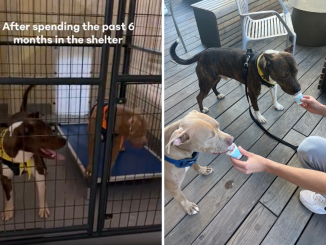
In the impoverished Gaza Strip, where most people struggle to make ends meet amid a crippling blockade, the suffering of stray dogs and cats often goes unnoticed.
Said el-Er, who founded the territory’s only animal rescue organisation in 2006, has been trying to change that. He and other volunteers rescue dogs and cats that have been struck by cars or abused and nurse them back to health – but there are too many.
So in recent weeks they have launched Gaza’s first spay-and-neuter programme. It goes against taboos in the conservative Palestinian territory, where feral dogs and cats are widely seen as pests and many view spaying and neutering as forbidden by Islam.
“Because the society is Muslim, they talk about halal (allowed) and haram (forbidden),” Mr El-Er said. “We know what halal is and what haram is, and it’s haram (for the animals) to be widespread in the streets where they can be run over, shot or poisoned.”
Islam teaches kindness towards animals, but Muslim scholars are divided on whether spaying and neutering causes harm. Across the Arab world, dogs are widely shunned as unclean and potentially dangerous, and cats do not fare much better.
Mr El-Er and other advocates for the humane treatment of animals face an added challenge in Gaza, which has been under an Israeli and Egyptian blockade since the Islamic militant group Hamas seized power in 2007. Gaza’s two million residents suffer from nearly 50 per cent unemployment, frequent power outages and heavy travel restrictions.
With many struggling to meet basic needs, animal care is seen as a waste of precious resources or a luxury at best. Mr El-Er’s group, Sulala for Animal Care, relies on private donations, which can be hard to come by.
Mr El-Er says his team can no longer keep up with the number of injured animals that they find or that are brought to the clinic. “The large number of daily injuries is beyond our capacity,” he said. “That’s why we resorted to neutering.”
On a recent day, volunteers neutered a street dog and two cats that had been brought in. There are few veterinary clinics and no animal hospitals in Gaza, so they performed the operations in a section of a pet store that had been cleaned and disinfected.
“We have shortages in capabilities, tools, especially those needed for orthopaedic surgeries,” said Bashar Shehada, a local veterinarian. “There is no suitable place for operations.”
Mr El-Er has spent years trying to organise a spay and neutering campaign but met with resistance from local authorities and vets, who said it was forbidden. He eventually secured a fatwa, or religious ruling, stating that it is more humane to spay and neuter animals than to consign an ever-growing population to misery and abuse.
Once the fatwa was issued, Mr El-Er said local authorities did not object to the campaign as a way of promoting public health and safety. The Hamas-run health and agriculture ministries allowed veterinarians to carry out operations and purchase supplies and medicine, he said.
The Gaza City municipality provided land for a shelter earlier this year. Before that, Mr El-Er kept the rescued animals at his home and on two small tracts of land that he leased.
The new shelter currently houses around 200 dogs, many of them blind, bearing scars from abuse or missing limbs from being hit by cars. At least one was adjusting to walking with a prosthetic limb. A separate section holds cats in similar shape.
The group tries to find homes for the animals, but here too it faces both economic and cultural challenges. Very few Gazans would keep a dog as a pet, and there’s little demand for cats. Some people adopt the animals from abroad, sending money for their food and care.
Over the past decade, international animal welfare groups have carried out numerous missions to evacuate anguished animals from makeshift zoos in Gaza and relocate them to sanctuaries in the West Bank, Jordan and Africa.
But there are no similar campaigns for dogs and cats, and Gaza has been sealed off from all but returning residents since March to prevent a coronavirus outbreak.
Mr El-Er’s phone rang recently and the caller said a dog had been hit by a car. Volunteers from Sulala brought it back to the shelter on the back of a three-wheeled motorbike and began treating it. Mr El-Er says they receive around five such calls every day.
“Inspirational Video: Visually Impaired Dog Shines Playing the Piano and Harmonizing with Sibling, Captivating Online Audiences and Becoming a Social Media Sensation”

A visually impaired beagle named Buddy Mercury has gained international acclaim on social media for forming an incredibly charming musical duo with his human sister. Despite his blindness, this music-loving canine exhibits remarkable piano-playing skills and harmonizes delightfully with his partner, showcasing a joyful spirit that remains undiminished.

Buddy Mercury, an eight-year-old beagle mix who was rescued, resides in Long Island, New York, with his human parents, Laurie and Glen Wolfe, and their 5-year-old daughter, affectionately referred to as Buddy’s “Lil Sis.” The couple adopted Buddy from a North Carolina animal shelter in April 2016 after he was discovered as a stray. They welcomed their daughter into the family the following year.

Laurie, 41, and Glen, 42, shared that Buddy has always been an integral part of their daughter’s life, fostering a heartwarming and endearing bond between the two. “It’s been a really sweet relationship to watch,” Laurie mentioned to The Epoch Times.
Buddy Mercury’s remarkable musical journey began just three months after his adoption, when Glen was taken aback while watching television. The piano unexpectedly started playing on its own, leaving Glen astonished. Quickly recording the enchanting moment on his phone, Glen captured Buddy playing the piano.

Initially, Buddy started “singing” in response to sirens from a nearby fire station. Soon, this became a routine, and Buddy began making musical melodies multiple times a day. Laurie shared, “It became part of his routine, and he’s really very happy when he plays because his tail is always wagging when he’s at the keys.”
Glen, a professional drummer, vividly remembers one of their earliest viral videos, in which their daughter entered the room with a guitar. The sequence of events that followed was nothing short of magical, as Buddy, looking out the window, joined in with his musical talents. “It was a magical moment, just unforgettable,” Glen fondly recalled.

In the summer of 2021, Laurie and Glen noticed a change in Buddy’s eyes. Upon seeking veterinary care, they were informed that Buddy had progressive retinal atrophy, a hereditary condition leading to complete blindness. Despite the heartbreak, the vet emphasized the importance of maintaining Buddy’s routines, including his piano-playing. “Through our tears we were smiling,” Laurie shared.
Although Buddy now faces challenges due to his blindness, Laurie and Glen administer eye drops to ensure his comfort. Despite occasional bumps into objects, Buddy’s independence remains strong. In solidarity with Buddy’s adjustment to life without sight, the couple has chosen not to adopt more animals.
Their heartwarming family band, featuring their daughter’s singing and Buddy’s piano-playing, serves as a compelling message advocating for animal adoption. Buddy frequently participates in community events, fundraisers, and interviews, where he enthusiastically performs in exchange for treats.

While Laurie and Glen maintain their day jobs, they hold onto the possibility that their unique musical collaboration could eventually lead to new opportunities. Laurie expressed, “There’s a lot going on in the world, but I think that there’s no better cure for whatever is hurting someone [than] choosing to rescue an animal.”



Leave a Reply